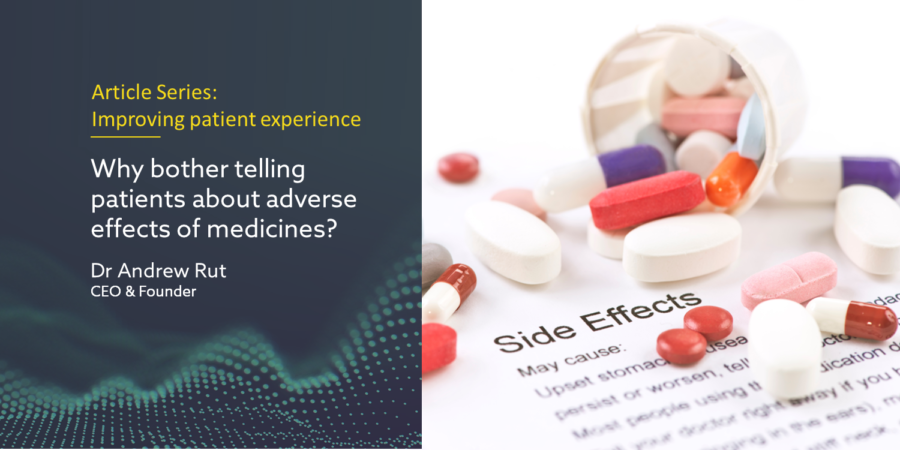Dr Andrew Rut, February 2022
To work, medicines must be taken as directed. Lack of adherence negates any benefit of the medicine. Adverse events (side effects) are often one of the most detrimental factors affecting adherence1. Acknowledging and addressing them is a fundamental tenet of good patient care, driving satisfaction and positive outcome.
Understanding the true impact of side effects
Medical professionals tend to focus on the serious end of adverse experiences while often trivialising the impact that ‘mild’ adverse experiences have on the lives of patients. Imagine the impact of loss of taste, diarrhoea, drowsiness, or difficulty sleeping when the medicine is to be taken long-term. Quality of life is destroyed leading to non-adherence.
The impact and importance of adverse events is, of course, situational and dependant on individual circumstances or disease. Whilst a significant, but non-serious, adverse event such as diarrhoea may be manageable for someone that is mostly home-based, it would be catastrophic for someone who commutes to work by train. Indeed, studies have shown that medically non-serious symptoms can significantly reduce adherence even for serious conditions. For example, it has long been understood that HIV antiretroviral therapies are often linked to taste disturbance and, despite the potential consequences of failing to control the virus, this can negatively impact treatment adherence2. Likewise, in a survey on patient experience of endocrine therapy for breast cancer side effects were commonly reported, with a third of patients reporting they did not feel that their side effects were taken seriously and a third of patients discontinuing treatment early3.
Addressing adverse event driven non-adherence
Addressing the barriers to adherence has been a long-standing goal of the healthcare system while for Pharma it clearly drives brand positioning and brand value. Many approaches have been considered from once-a-day dosing, combination products, diary reminders, even digital pills. However, given adverse events are one of the primary drivers of non-adherence, reducing their frequency and impact is key. To do this effectively, Pharma must first understand the medicine profile fully, what issues patients experience, which patients are impacted most by the adverse experiences, and for how long.
Only with this understanding can pharma create a risk mitigation plan that starts with the label and clearly outlines any risks. However, this must be accompanied by clear communication regarding what a patient should expect and how long for, and how to mitigate issues, for instance by dose reduction, timing of dosing, taking with food or fasting etc. Obviously where risks are serious, it is incumbent on Pharma to warn and monitor whether communication is having the desired effect. Again, the collection, monitoring and analysis of adverse events is key.
What is undeniable is that having a clear picture of the true safety profile of a medicine in real-world use, is the first and most fundamental step in managing risks and medicine adherence. The profile of a medicine is not static but evolves over years as exposure to new demographic or disease groups increases - thus safety monitoring must continue and adapt during the product lifecycle. Audience-appropriate communication is essential to educate both patients and their healthcare professionals (HCPs) on the likelihood and severity of side effects as well as potential mitigation factors. Ensuring this information is clearly conveyed alongside the benefits of treatment will help patient manage their medication and their health outcomes.
Additionally, evidence is now emerging to suggest that educating patients on side effects could positively impact adherence. It has long been thought that communicating side effects can increase their likelihood. However, an emerging approach suggests that educating patients on the meaning of side effects and truthfully describing certain minor side effects as a sign the treatment is active and working in the body can improve patient experience and treatment outcomes in pain, hypertension, and allergy4.
Communication is key
To truly understand the benefits and risks of medications pharma must develop a full understanding of side effects and their real-life impact. Through this understanding pharma can create clear advice and guidance to both patients and HCPs that enables them to act and mitigate unpleasant side effects – or at least understand them – to enhance overall patient satisfaction, increase adherence, and ultimately improve health outcomes.
Example: The situational impact of side effects
Imagine two people have taken antihistamines before boarding an airplane, products that have been available for many years and whose safety profile is well understood. However, upon boarding one person turns right, finds her seat, and settles down for the duration of the flight, but the other turns left – he is one of the pilots!
It turns out that the passenger had been made aware that drowsiness is a common side effect for antihistamines and had taken the product to help her fall asleep during the flight. In contrast, the pilot inadvertently took a sedative antihistamine contained in an over-the-counter cold remedy. He now faces take-off not at the required level of alertness.
The moral of this tale is that even when product safety profiles are well understood the seriousness of side effects may be different for different situations. Therefore, clear and consistent communication is essential to enable individuals to make the appropriate decision for themselves.
References
1. Adherence to Long-term Therapies: Policy for Action (2001)









